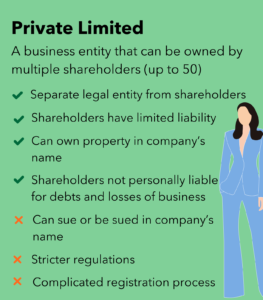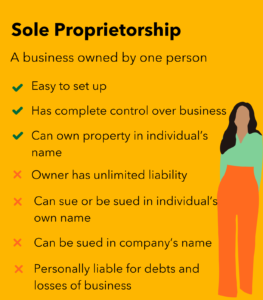Choosing the Best Business Structure for Freelancers and Self-Employed Professionals in Singapore
At Counto, we know that setting up your business correctly is crucial, especially for freelancers and self-employed professionals looking to establish themselves in Singapore. The business structure you choose has significant implications for your liability, tax obligations, and ability to attract investment.
In this guide, we’ll compare two popular structures for freelancers: Sole Proprietorship and Private Limited Company. We’ll help you understand each option’s benefits, drawbacks, and key differences to make an informed decision best suited to your professional needs.
Understanding Sole Proprietorship
What is Sole Proprietorship?
Sole proprietorship is the simplest business form, where the business is indistinguishable from the owner. It’s popular among freelancers and self-employed individuals due to its straightforward setup and minimal compliance requirements.
Advantages of Sole Proprietorship:
- Easy and inexpensive to establish with minimal paperwork.
- Full control over business decisions and operations.
- Less stringent tax compliance; no requirement to file annual returns.
Disadvantages of Sole Proprietorship:
- Unlimited liability means personal assets are at risk if the business incurs debt or legal issues.
- Lacks the tax benefits of corporate tax rates; income is taxed at personal income tax rates.
- The business ceases to exist upon the owner’s death.
Registration Process:
- Name Your Business: Register your business name with ACRA, ensuring it is unique and available.
- Provide a Business Address: Register a principal place of business. If operating from home, apply for the Home Office Scheme.
- Assign a Local Authorised Representative: If residing outside Singapore, appoint a representative who meets specific legal requirements.
- Register with BizFile+: Complete the registration through ACRA’s BizFile+ portal, paying the necessary fees.
Understanding Private Limited Company
What is a Private Limited Company?
A private limited company is a more complex business structure, treated as a separate legal entity. It is the most popular and flexible business form in Singapore, especially suitable for those looking to scale their operations.

Advantages of a Private Limited Company:
- Limited liability protects personal assets against business risks.
- Ownership can be transferred, and additional investors can be added easily.
- Attractive tax exemptions and incentives, such as no tax on capital gains and significant tax relief for new startups.
Disadvantages of a Private Limited Company:
- More expensive to set up and maintain due to compliance and registration costs.
- Subject to more rigorous regulatory requirements and compliance standards.
Registration Process:
- Choose a Company Name: Secure a unique name approval from ACRA.
- Appoint Directors and Shareholders: At least one director must be a resident of Singapore. You can have 1 to 50 shareholders.
- Invest Paid-up Capital: Minimum of S$1 required initially.
- Provide a Registered Address: Must be a physical address in Singapore.
- Appoint a Company Secretary: Required to ensure compliance.
- Appoint an Auditor: Necessary within three months of incorporation, unless exempted.
Legal and Tax Considerations
Sole Proprietorship Taxation:
- Current personal income tax rates in Singapore vary from 0% to 22%. Sole proprietors are taxed at these individual rates.
Private Limited Company Taxation:
- Subject to corporate income tax at a flat rate of 17%. Benefits from various tax exemptions and incentives, significantly lowering tax liability in the initial years.
Which Business Structure to Choose?
Consider the following factors when deciding between a sole proprietorship and a private limited company:
- Liability and Risk: How much personal risk are you willing to accept?
- Investment Needs: Will you need to raise significant capital?
- Tax Considerations: Which tax structure aligns better with your financial goals?
- Credibility with Stakeholders: How important is the perception of your business structure to your clients and investors?
For freelancers and self-employed professionals, switching from sole proprietorship to a private limited company often aligns with growth and the need for limited liability and enhanced credibility.
Using an incorporation service as an extension of your team
Setting up a company in Singapore can be challenging, but with professional support, it can be simple. Counto’s mission is to support your new business, take away the complexities of compliance, and save you time and money throughout the year. Speak to us directly on our chatbot, email us at [email protected], or contact us using this form.
Here are some articles you might find helpful:
Guide to business structures and common mistakes








